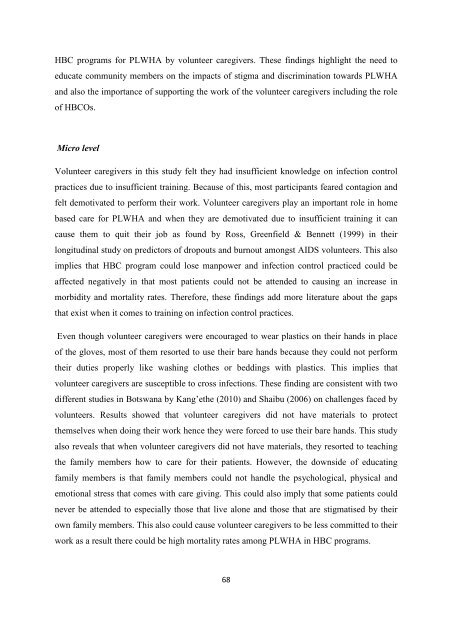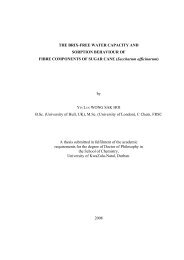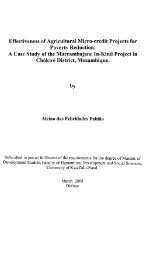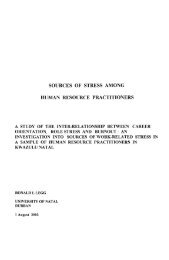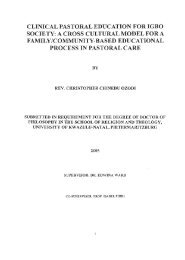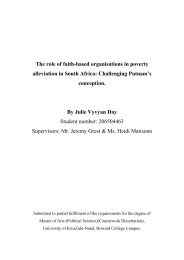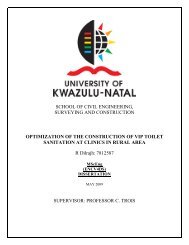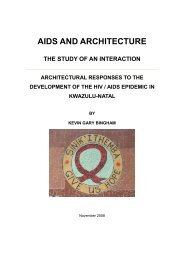View/Open - ResearchSpace - University of KwaZulu-Natal
View/Open - ResearchSpace - University of KwaZulu-Natal
View/Open - ResearchSpace - University of KwaZulu-Natal
You also want an ePaper? Increase the reach of your titles
YUMPU automatically turns print PDFs into web optimized ePapers that Google loves.
HBC programs for PLWHA by volunteer caregivers. These findings highlight the need to<br />
educate community members on the impacts <strong>of</strong> stigma and discrimination towards PLWHA<br />
and also the importance <strong>of</strong> supporting the work <strong>of</strong> the volunteer caregivers including the role<br />
<strong>of</strong> HBCOs.<br />
Micro level<br />
Volunteer caregivers in this study felt they had insufficient knowledge on infection control<br />
practices due to insufficient training. Because <strong>of</strong> this, most participants feared contagion and<br />
felt demotivated to perform their work. Volunteer caregivers play an important role in home<br />
based care for PLWHA and when they are demotivated due to insufficient training it can<br />
cause them to quit their job as found by Ross, Greenfield & Bennett (1999) in their<br />
longitudinal study on predictors <strong>of</strong> dropouts and burnout amongst AIDS volunteers. This also<br />
implies that HBC program could lose manpower and infection control practiced could be<br />
affected negatively in that most patients could not be attended to causing an increase in<br />
morbidity and mortality rates. Therefore, these findings add more literature about the gaps<br />
that exist when it comes to training on infection control practices.<br />
Even though volunteer caregivers were encouraged to wear plastics on their hands in place<br />
<strong>of</strong> the gloves, most <strong>of</strong> them resorted to use their bare hands because they could not perform<br />
their duties properly like washing clothes or beddings with plastics. This implies that<br />
volunteer caregivers are susceptible to cross infections. These finding are consistent with two<br />
different studies in Botswana by Kang’ethe (2010) and Shaibu (2006) on challenges faced by<br />
volunteers. Results showed that volunteer caregivers did not have materials to protect<br />
themselves when doing their work hence they were forced to use their bare hands. This study<br />
also reveals that when volunteer caregivers did not have materials, they resorted to teaching<br />
the family members how to care for their patients. However, the downside <strong>of</strong> educating<br />
family members is that family members could not handle the psychological, physical and<br />
emotional stress that comes with care giving. This could also imply that some patients could<br />
never be attended to especially those that live alone and those that are stigmatised by their<br />
own family members. This also could cause volunteer caregivers to be less committed to their<br />
work as a result there could be high mortality rates among PLWHA in HBC programs.<br />
68


